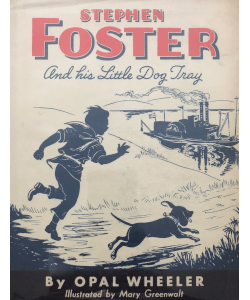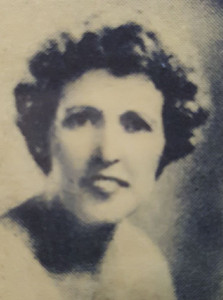Stephen Foster and his Little Dog Tray

Author:
Opal Wheeler ![]()
![]() Complete Authored Works
Complete Authored Works
Illustrator:
Mary Greenwalt
Publication:
1941 by E. P. Dutton & Co., Inc.
Genre:
Biography, Music, Non-fiction, Performing Arts
Series:
Opal Wheeler Music Biographies
Pages:
172
Current state:
Basic information has been added for this book.
It has been read but content considerations may not be complete.
Book Guide
Search for this book used on:
Behind the gentle sadness of such songs as Old Black Joe, My Old Kentucky Home and Old Folks At Home, lies the dreaming, home-loving spirit of the man who wrote them—Stephen Collins Foster. Behind the rollicking tunes with which these were interspersed lies all the fun-loving gayety which so richly colored and warmed young Stephy's happy companionship with his devoted older brother, Mit, throughout their happy boyhood . . .
Here in this story of a typical American boyhood are quick, intimate glimpses of young Stephen as he trotted off to the Negro church beside Lieve, the Negro bound girl; as he played with his beloved dog; and raced along beside a minstrel band. Here is the young boy, growing up with music in his heart and a warm, out-reaching friendliness for everyone with whom he came in contact, a boy who comes vividly alive in the pages of a most delightful book . . .
There is much more in this book than the engaging story of the young Stephen Foster, and his never-to-be-forgotten music. In this appealing, sensitive biography of the composer whose folk songs are our common heritage, is told one of the real stories of our own America.
From the dust jacket
A word from Opal Wheeler taken from the dust jacket:
"Stephen Foster's Negro songs would have more meaning for children if they knew that more than anything else, Stephy loved to go to the minstrel shows with Mit, and when they came to town, he sat in the front row of the hall, listening breathlessly to the Negro melodies of "Jump Jim Crow", and "Long-tailed Blues." Early one morning he called the neighborhood boys together in the old carriage house behind the Foster home. They would have a minstrel show, too! With joyous shouts they cleaned and swept all day long, the dust rising in clouds to the rafters.
When the practicing began, it was decided that Stephy should be the star performer, for no one else could sing and dance so well. When all was ready, mothers, fathers, sisters and brothers, bought their tickets at the carriage house door and sat on boxes and kegs, waiting for their performance to begin. The ragged curtains opened, and there sat a little colored boy, a tall black hat resting on his ears. Rolling his eyes to the rafters and strumming on his banjo, he began to sing, "First on de heel, tap, Den on de toe, and Ebbrey time I turn around I jump, Jim crow." "Why it's Stephy!" whispered Mother Foster to her husband in astonishment. "Yes, and with my best Sunday hat on!" . . .
To view an example page please sign in.
Content Guide
Please sign in to access all of the topics associated with this book and view other books with the same topics.
Please sign in to access the locations this book takes place in and view other books in the same location.
Please sign in to access the time periods this book takes place in and view other books in the same time period.
For information about the lead characters please sign in.
Please sign in to access information about the content of this book that you may want to consider before reading.
Find This Book
Search for this book used on:



